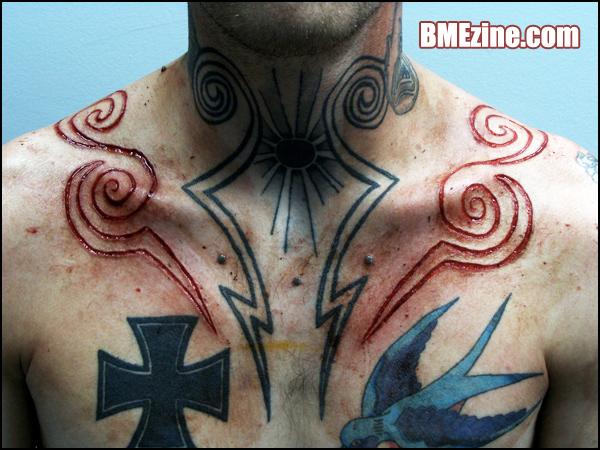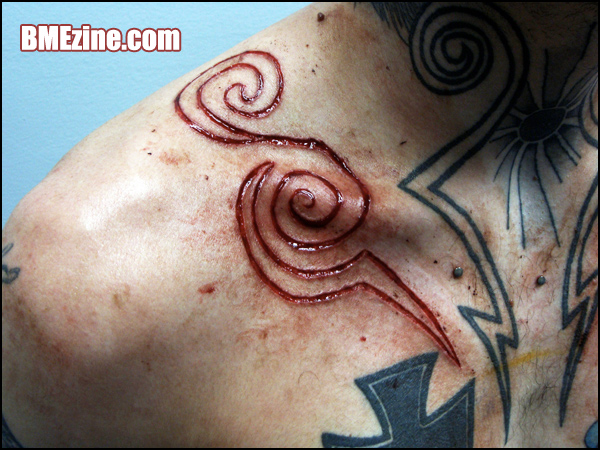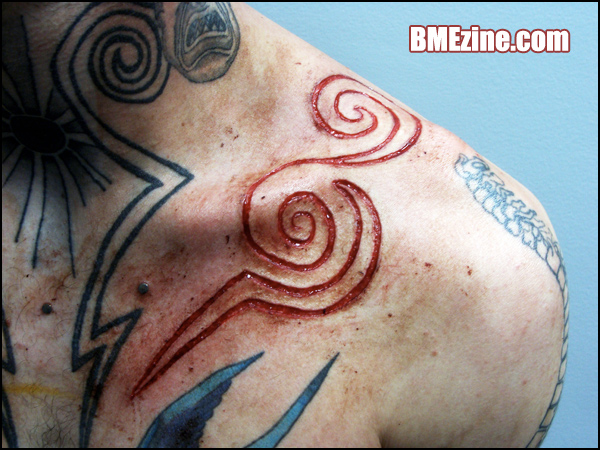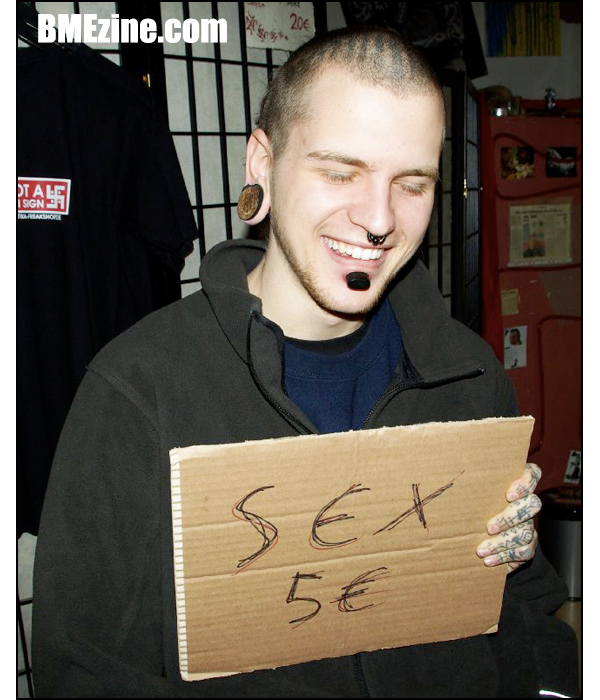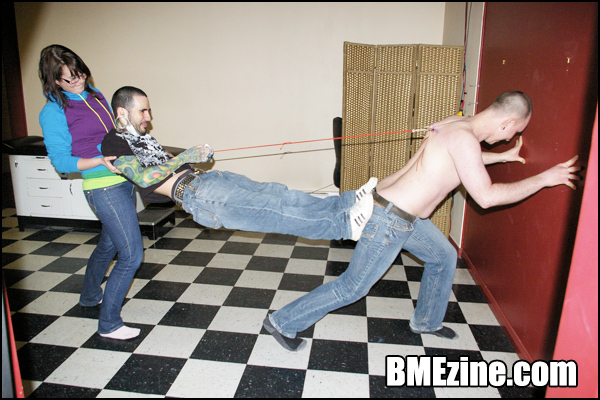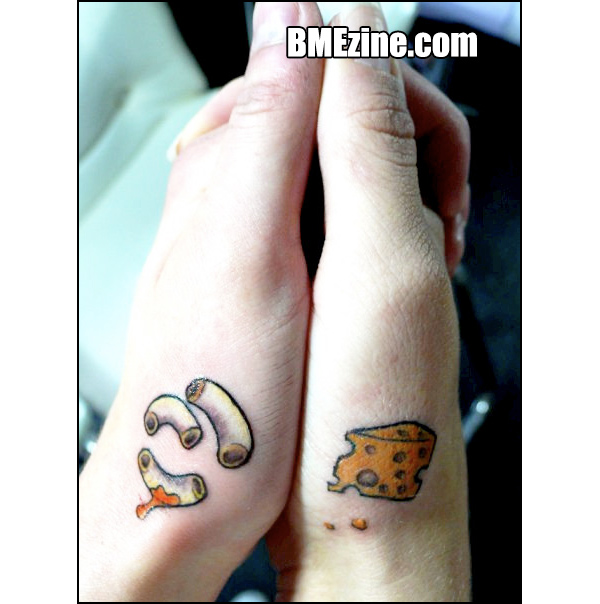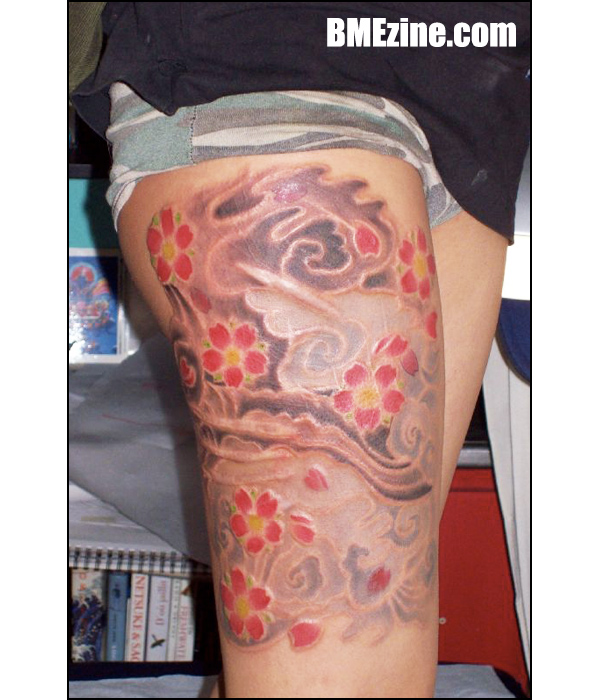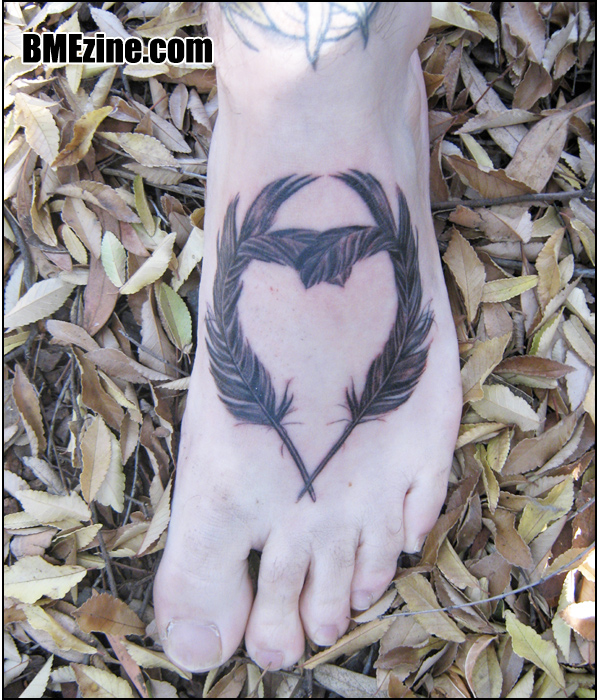Welcome to BME’s Big Question! In this feature, we ask a handful of the community’s best and brightest piercers, tattooists, heavy mod practitioners and shop owners for their opinion on one question or issue that’s affecting the body modification community. Many, many thanks to all of the contributors.
If you’d like to be a part of future editions, or if you have an idea for an issue or question you’d like to see addressed, please e-mail me.
This week’s topic:
Do you support government regulation of body modification practices? And if/when there were to be regulation, do you think that tattoos/piercing/scarification/etc. should all be under the umbrella of “body modification,” or would you rather they be kept fundamentally separate in the eyes of the law?
* * *

Joy Rumore |
I would theoretically support regulation for the sake of client and practitioner safety, but realistically it would be a NIGHTMARE.
It’s hard enough to find doctors that don’t panic at the first sign of a healing tattoo or piercing, let alone those who would be willing to stand up to their peers and condone body modification publicly and THEN be willing to create and support regulations for the industries.
Even if all that did happen, there are the hurdles of politicians and PTA mothers to clear, as well. Or am I being too pessimistic?
|

Tracy Baer |
My guess is that you’re being realistic, Joy. And pessimistic or not, the politicians and PTA mothers are the hurdles that would be the hardest to clear. Well worth the effort, but still a tricky one.
The rules and regulations on tattooing have caused our industry to improve in countless ways just in the last decade. Ever tightening boundaries on what is considered safe and sane in the world of tattooing has caused those of us who tattoo for a career to improve and adapt. In my opinion, those changes have been for the good.
Long gone are the days of tattoos only being for “sailors and whores.” Don’t get me wrong, I still tattoo my fair share of both groups…but, we see a wide mix of people on a daily basis. Church ladies share a couch in the waiting room with gangster rappers while waiting for us to finish tattooing the cop. The surgeon on his day off stops in for a consult on his back piece, while the renegade biker brings his daughter for her first piercing.
And that’s not even the tip of the iceberg.
There have been many changes I’ve grumbled about over the years, but in reality, it’s the things I’ve grumbled about that have caused my chosen career to become widely accessible to all of those groups, and more. You learn to work around the ones you don’t care for…and find, for the most part, a better way.
|

John Joyce |
I would support regulations if they were made with the support of people in our industry. Too often bureaucrats and health department officials write up the regulations without getting any input from someone in our field. The health inspectors that inspect studios in most places are used to inspecting restaurants. They don’t really know what they are looking for in a tattoo/piercing studio.
California right now is in the process of writing regulations. They met in a few different cities with piercers, tattoo artists, the APP was represented by Steve Joyner, and that is how I feel it should be. That way you are getting regulations that make sense.
|

Meg Barber |
Well said, Tracy.
The idea of regulating the things we do is a double-edged sword. On one hand, rules and guidelines set up and ENFORCED are a wonderful thing, but only when the rules and guidelines are created with input from the practitioners who are professional and on top of their game. I have worked in shops in the past that were about as dirty and unethical as it gets (this was over 10 years ago), but the owner tattooed a health board member and got to make up the rules—that is TERRIBLE. That’s why the autoclave area was also a break room.
Other cities get it right though. In Philadelphia, if I am not mistaken, shops must use internally threaded jewelry for initial piercings. They hit gold when they got Bill Funk to help write legislation.
Of course, the downside to responsible legislation is that it sometimes harnesses what we can do as far as more extreme procedures. The law tends to frown on scalpels, biopsy punches, anesthetics and the like. It’s a cross we have to bear, I suppose: Do we operate within the laws designed to protect the public from the stupidity of people who don’t know what they are doing, or do we break the law because we are responsible and know how to use the tools we aren’t supposed to be using?
If legislation were to go into effect that really, truly protected people—the outlawing of ear piercing guns, the requirement of weekly spore testing for all autoclaves and statims, mandatory bloodborne pathogen training, etc.—then that would be the right start, in my opinion.
|

John Joyce |
Where I live and operate my studio, there are no regulations—other than the state law of not tattooing anyone under 18 or who is intoxicated. I’ve been open for eight years, and worked in this area for almost four years before that. In 12 years, I’ve never seen an inspector, or even heard of one inspecting any studio around here.
I would love to work with the health department or whoever, to set at least a minimum set of guidelines that all studios have to follow. Walk into most studios around here and ask them what a spore test is and when the last time they ran one was? You’ll get blank stares.
|

Meg Barber |
John, being in NY as well, we have NO inspections. We have to hang a sign up that says if you are unhappy or have a complaint, dial 311.
In NYC, where we are, it’s worse than the usual statewide ignorance, I think. There are sunglass vendors doing piercings at sidewalk stands for $30, jewelry included, no age limit. We hear horror stories all the time of the St. Marks piercers doing 14-year-old kids’ nipples and stuff.
Tattoo artists are required to register with the city, get a license, etc., but piercing is totally and completely unregulated. It’s terrifying.
|

Tracy Baer |
I like to think if I were in an area with absolutely no regulations, I would run, not walk, to the powers that be and get started with some input. With a quickness.
This in NO WAY is meant to cause a fuss, or to point fingers, but it’s easier to complain about the lack of (or problems with) regulations if you have no intention of trying to be involved. Please correct me if I’m wrong, but in most cases there should be a chain of command to follow that will lead you to a meeting or an individual with whom you can voice your concerns.
|

John Joyce |
I’ve contacted the health department in the past and was told there was nothing they could do because they just didn’t have the money.
I’ve even had clients tell me that they had called the health department on other studios after having work done there, and were told the exact same thing.
|

Meg Barber |
New York just doesn’t give a flying fig about it. They figure that the people can govern themselves, which is REALLY backwards considering that tattooing was illegal here until very recently because of the health problems associated with dirty tattooing. That’s why the licensing is in place, although from what I understand, it’s pretty useless. Our piercer at our other store has a tattooist license just so he can get wholesale pricing on piercing supplies through a few NYC–based companies.
Funding for such things is very limited here. It’s there for welfare programs and other things, but not there for the general health and welfare of people getting modified. If I was 16 and knocked up here, I’d get the best care, but if I get the hep from a dirty studio? Forget it.
|

John Joyce |
NYC is a little different than the rest of the state. We don’t even have a tattoo licensing process here [in Syracuse]. Although, I have heard that the licensing process in NYC is set up more to make the city money than to actually benefit the general public.
Another big problem I’ve seen is areas that have good regulations in place don’t have the funds to enforce them. Look at Philadelphia. It has some of the best piercing regulations in the country. But, they aren’t enforced at all, and you can walk into any number of studios and get pierced with crap externally threaded jewelry, even though regulations say you can’t use that for an initial piercing.
|

Meg Barber |
True. Money always seems to be best put to use on other programs. Giving everyone who smokes in your city the patch for free is more important I guess.
I asked Maria about the health inspections here in NYC. In 17 years, there has never been one, but about 10 years ago, someone with a fake badge came around and demanded $100 to do an inspection.
Have any of you actually worked with the health departments in your areas?
|

Derek Lowe |
When I lived and pierced in Madison, Wisconsin (’96-’98), I worked closely with the state when they decided to set up statewide regulations. They formed a committee of three piercers, three tattoo artists, a doctor, a public health nurse, an epidemiologist and a few other people. They had a basic template when we started and then we worked on refining the regulations. For the most part it was a pleasant and productive process. The non-practitioners were respectful of what we had to say and in many cases took what we said about our specific industries very seriously. We ended up with what I felt was a decent set of regulations. Unfortunately, I left the state before those regulations went into effect. I can’t speak to how well they are, or aren’t, enforced.
Here in Minneapolis (and they are looking at going state-wide soon), we have a set of regulations that isn’t bad. There are definitely some things that could be improved. The regulations were created before I lived here, but it is my understanding that there was input from at least a few piercers and tattoo artists. Unfortunately, those regulations include bans on branding, scarification, implants and suspension.
I have worked with the Minneapolis health department a fair amount, but they seem to be in the position that most health departments are in: they don’t have the money to do any more than the bare minimum they are required by law. We get our once-a-year inspection (which is okay, but not fantastic) and we don’t see them again unless there is some sort of complaint.
I think the key to good regulations (which I support) is having knowledgeable, ethical practitioners involved in the process from the beginning. It’s much easier to get the regulations right the first time around than it is to try and get them to go back and change things once they are in place.
|

Steve Truitt |
In New Mexico, the laws went statewide late last year—instead of just the city of Albuquerque, like they have been for the last 10 years or so. The laws were written with piercer and tattoo artist input, and there is a piercer and tattoo artist on the board that regulates us (Board of Barbers and Cosmetologists unfortunately).
We have some decent laws, like all shops have to pierce with implant grade jewelry, for example. However, they straight-up told us that they are not going to enforce the laws or shut down any shops that refuse to comply because then they couldn’t make any money off of that shops permits, etc.
It always comes down to money. Even if they didn’t enforce the laws and just sent out a letter or something pretending that they were going to, it might help make a lot of these shops clean up their acts or close down on their own. The stupidest thing they could have done is what they did by telling us that yeah, these are the laws, but they have no intentions of enforcing them because they want to make as much money as possible—and that means giving everyone with $300 a permit even if they don’t meet any of the “qualifications” that the board has set to get a permit in the first place.
|

John Joyce |
I’ve heard that same story a lot—that basically, you send you city, county, or state some money to get a certificate and that is basically it. After that, there is no real enforcement.
I think it’s great that the stories some of you have shared involve meetings with piercers and tattoo artists to set the regulations up, but it doesn’t do any good if they aren’t enforced.
|

Derek Lowe |
I’m not trying to make excuses for health departments or health inspectors that aren’t doing their jobs. I do think it’s important, though, to keep in mind that very few of the people involved in inspecting and enforcing piercing/tattoo regulations know anything about the industries to begin with. So, not only are they being asked to take on additional inspections, and probably for no additional pay, they are also expected to further their education regarding piercing and tattooing with very little, if any, resources (i.e., time and money) being provided by their health departments. Most inspectors are trained in inspecting restaurants, nursing homes, local fairs and possibly hospitals—not piercing and tattoo studios.
Clearly, continuing education is part of any job. Imagine, though, if someone came along and told you that you needed to become familiar with how to do a manicure or a pedicure. After all, those things involve the body just like piercing and tattooing…even though you have no interest in those things. Now, not only do you have to learn that stuff, but you aren’t going to be given any time or money to do it.
I don’t think it’s hard to imagine how much time and effort any of us would put into learning about those procedures.
|

Ryan Ouellette |
I’m terrified of regulation. On the plus side, it would keep some crappy shops less crappy, but I’d be concerned with the state banning procedures they don’t understand. A few years back, New Hampshire tried to ban all piercing because some councilman’s daughter got an illegal piercing. So rather than just making stricter rules, they attempted to outright ban the entire practice. I would love to see responsible regulations in place, but not if it limits what procedures can be done. In the last few years, New Hampshire has actually lessened regulation due to budget restrictions. They can’t afford to inspect shops anymore, so basically everybody works off the honor system, and you can imagine how ridiculous that gets.
I’m sure every body art worker wants reasonable regulations. I don’t think the majority of health departments are educated enough to understand what it is they’re regulating and how best to do so. The double edged sword is that it’s often one individual’s personal opinion that decides what gets a regulation and what gets a ban.
|

John Joyce |
Over-regulation is definitely a major concern, and the possibility of banning certain procedures is part of the reason I’m OK with the lack of regulations we have right now. That doesn’t mean I wouldn’t love to see some reasonable safety guidelines set in place. I think there should be checks at least twice a year to make sure at the very least studios are running regular spore tests.
|

Derek Lowe |
“The double edged sword is that it’s oftentimes one individual’s personal opinion that chooses what gets a regulation and what gets a ban.”
That’s very much true. When I first moved to Minneapolis I was discussing the ban on suspension with the inspector who handles piecing and tattoo shops. I asked her why suspensions were banned and she responded with something along the lines of: “Someone brought in a tape of it for us to watch. Have you seen that stuff?! My God.”
Seems as though they were pretty freaked out by it and so they went the route of banning. I don’t think any of the piercers involved in the process were interested in suspension, so I don’t think they fought it very hard, if it all.
|

Jordan Ginsberg |
Would you rather potential legislation be focused on “body modification,” as a catch-all for piercing, tattooing, scarification, implants, etc., or do you think those should all be treated as separate industries?
|

Derek Lowe |
I think it makes sense for cities/states to address them at the same time, so maybe in that sense they should be grouped together. However, I think it’s important that each discipline be addressed individually to make sure the regulations make sense, are effective and are enforceable.
|

Steve Truitt |
The problem is, if they’re treated as separate industries, most people don’t know much about scarification, implants, etc., so if they have to go make separate laws about that instead of grouping it all under a body art law they will most likely just make it illegal.
There are enough piercers, tattoo artists, and mod practitioners together to make up a legitimate presence at a hearing to pass laws about those issues. If they break it up separately there are a lot fewer people in each category and that makes it easier for them to pass laws to regulate us out of business completely.
Most laws for public safety in a piercing, tattoo, mod studio apply to any form of modification as well, so separating them is more of a headache for law-makers, too, which makes them less likely to want to do that. It’s much easier for a lawyer, politician, etc., to say, “Make that illegal” than to say, “Make it legal, but make sure that anyone doing it is complying with this 30 page list of rules and regulations I’m going to draw up.”
|

John Joyce |
I don’t see any problem with grouping them together. Like Steve said, it makes it less likely that they will just make certain things illegal. For the most part, a lot of the regulations would be the same anyway: age requirements, spore testing, autoclave logs, single-use sharps, sharps disposal, etc….
|

Tracy Baer |
OK, maybe I’m talking in an ideal world that they should be separate.
Honestly though, how much in common does tattooing have with any of the things that you all are discussing? Aside from the fact that they both are a modification to the body and that these days they share a building.
|

Ryan Ouellette |
I’m sure to all of us the difference between piercing and tattooing is like night and day. But, to someone outside of the industry, they aren’t going to care. They’re just all things that make their granddaughters look like whores.
|

Steve Truitt |
Tattooing has plenty in common. Like John pointed out, autoclave usage, spore tests, use of gloves, using sterilized single-use needles, disposal of sharps, use of disinfectants, etc. I’d say about 90 percent of the laws in most places could go for any type of modification, and only about 10 percent are specific to any one form of it.
|

John Joyce |
Exactly. There are going to be some specific laws for each, but the most important regulations are going to be pretty universal.
|
What do you think? Let’s hear it in the comments.
* * *
Please consider buying a membership to BME so we can continue bringing you articles like this one.
